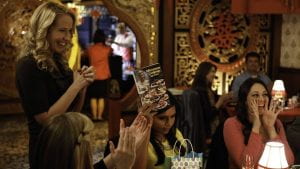Something that really resonated with me within our discussion of Jane the Virgin was the idea of the romantic comedy and how it defines the show, creates and alienates an audience, and sets the entire tone of the show. This applies strongly to The Mindy Project where the entire show is centered around Mindy’s search for love and (in her eyes) the perfect life. In the season two finale, “Mindy and Danny”, she finally gets her true love in, as the title suggests, the form of Danny. In true comedic fashion their journey towards each other was hilarious, complete with montages of Mindy crawling up stairs and Danny getting hit by a taxi. And in true romantic fashion, Mindy gets her happily ever after, on top of the Empire State building à la every classic New York romantic movie, even if she is too exhausted from climbing the stairs to stand. She has the perfect partner, great friends, and a wonderful job. Mindy has it all.

Mindy and Danny having their romantic moment on top of the Empire State Building.
This is the cornerstone of the rom-com genre: through trials and tribulations on a journey of self-discovery, it generally (but, as we learned in Jane the Virgin, not always) ends with the women “having it all”. This idealistic idea includes the women being a perfect mother, wife, worker, friend, daughter, and a host of other roles. And while it’s the goal for some, it rarely works without a hitch in real life. This is where The Mindy Project comes in: it’s the imperfect rom-com. Mindy’s an unlikely hero, and even during her perfect ending Danny quips about her becoming a stay-at-home mother, even through her job and her professional ambitions are vital to her sense of self. The show does something unlikely in demonstrating that the heavily anticipated relationship is not perfect, or anywhere relatively close to it. For most stereotypical rom-com heroines, once they find their partner, they abandon their job to focus on working in the home. And it is a completely respectable choice; however, it is not the choice for Mindy.
That what I love about the show: for better or for worse, it demonstrates an unapologetic amount of honesty and candor. As a subset of the rom-com genre, it’s more representative, shows more relationship failures, and genuinely doesn’t shy away from the issues surrounding the modern romance. Mindy is not your classic heroine, in more ways than one, and she doesn’t try to become something that she isn’t. This show flipped the entire genre and its subsequent expectations on their head and completely revamped them. Real life is not like the romance movies and getting more shows with more accurate representations and expectations is vital. The Mindy Project does just that.


